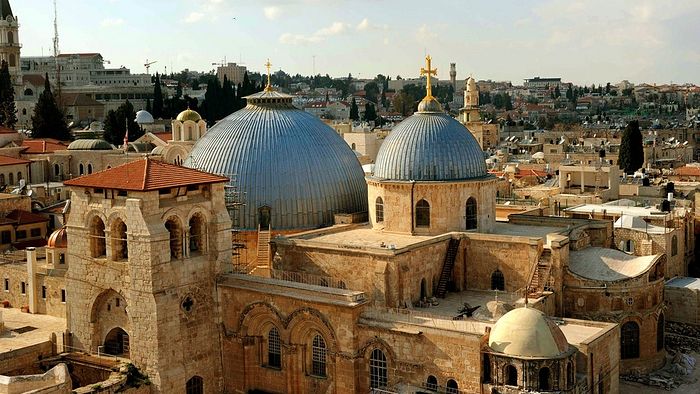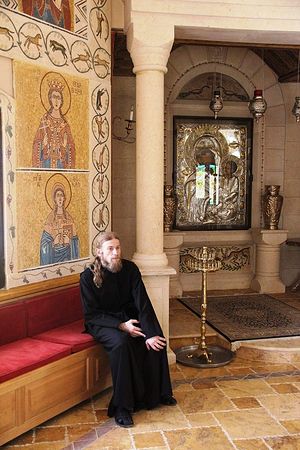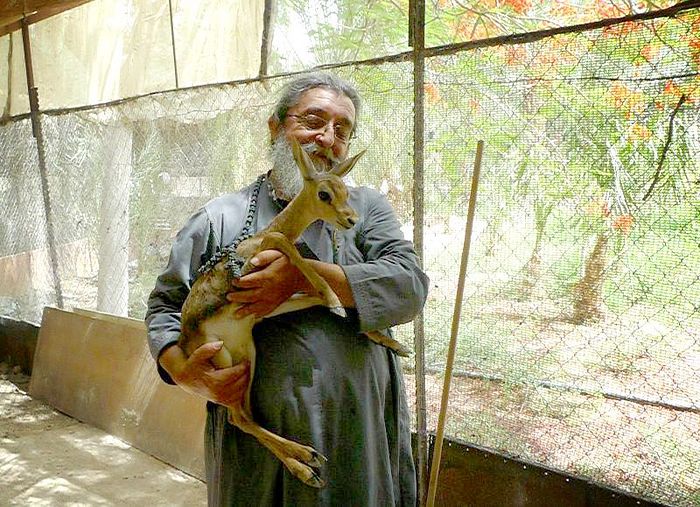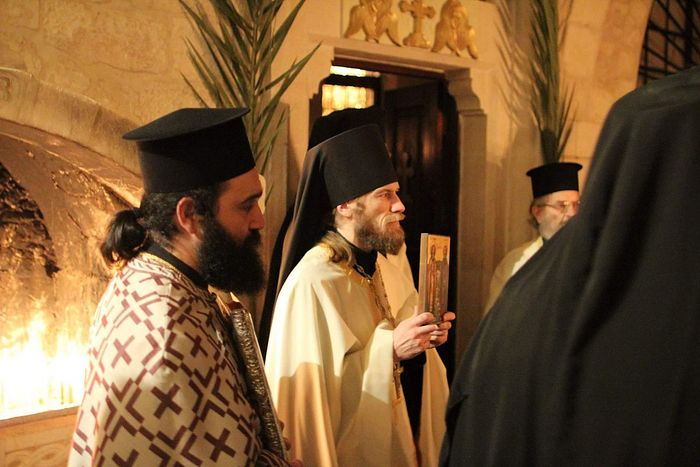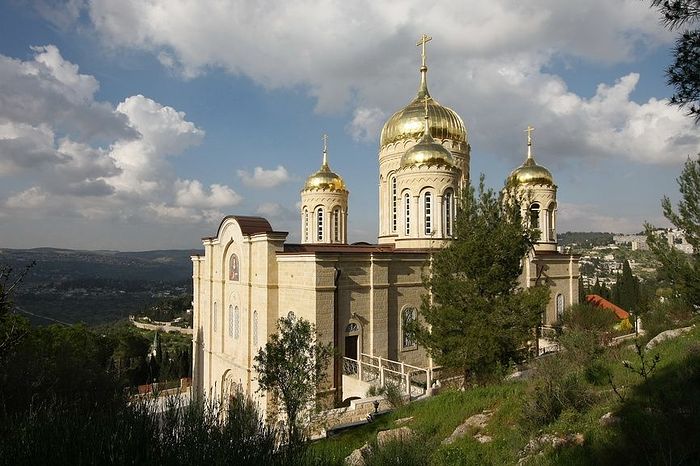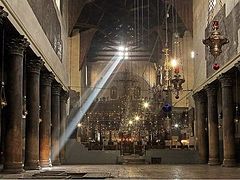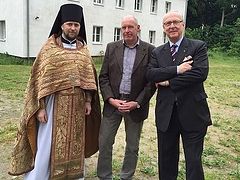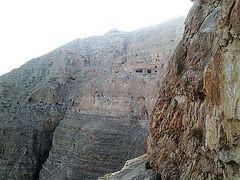We are speaking with Igumen Leonty/Leontius (Kozlov), a former teacher of the Moscow Theological Academy, author of the book, The Faith of the Heart and Confession with the Mouth, and a staff member of the Russian Ecclesiastical Mission in Jerusalem.
—Fr. Leonty, you graduated from the Moscow Theological Academy where you taught Greek after that. You have been to Greece and Mt. Athos many times. What are the major differences between the Greek Orthodox traditions and the Russian ones?
—There are hardly any differences between the Greek Orthodox and Russian Orthodox services except perhaps the language. Though the Greek Church has some differences when it comes to the daily cycle of services—for example, they always celebrate Matins in the morning prior to the Divine Liturgy. Their prosphora differ from ours in shape; parishioners themselves bake and bring prosphora to church and then take them back home after services. The Blessing of the Waters is performed there on the first day of each month; their service of the sacrament of Baptism is more solemn than ours; confession is not tightly connected to Communion [according to the modern Russian Orthodox tradition, the faithful always go to confession before Communion—Ed.]; and so on. Greek parishes maintain a good tradition of drinking coffee with the priest after the service when parishioners have an opportunity to ask him any questions and talk “without reserve”. Undoubtedly, hospitality towards others is an inherent tradition of Greek culture; to offer at very least a glass of water and a spoonful of jam to a stranger is an “unalterable law” there. Whatever monastery of Greece or Holy Mount Athos you may visit, you will surely be treated to some food there, shown its holy shrines, and have a good talk.
—Both Mt. Athos and Russia have a wealth of great shrines. What kind of a pilgrimage will be of benefit to believers?
—If you go on pilgrimage with a spiritual purpose and not out of curiosity, it is a labor and you will certainly benefit from, whether it be Russia, Mt. Athos, or Greece. Formerly pilgrims walked on foot and burdened their flesh; that was arduous toil for the Glory of God. In our days we move fast and comfortably, so our modern pilgrimages are like outings or pleasant travels, so it is hard for God to struggle His way to our hearts through these external shells. All the more reason why we should perform spiritual labors, read spiritual literature and pray. Without a doubt Mt. Athos enriches and inspires us particularly. There you find yourself in a different world (a monastic republic), which lives by other interests, and your heart becomes ignited with the general spiritual fervor. People who see Athonite monasteries for the first time are impressed in particular—they come to realize that they can be guided by other values and ideals that are different from those cherished by this world.
—Since late 2013 you have worked in the Holy Land, namely at the Russian Ecclesiastical Mission in Jerusalem. What are your duties there? What is the Russian Ecclesiastical Mission like and what are its tasks in the Holy Land today?
—I have had various obediences. Currently I work as a treasurer here and I am responsible for performing services of need, and the Mission’s cooperation with the Patriarchate of Jerusalem. The Mission manages the plots of land and monasteries of Russian Palestine, ensures the celebration of services in churches, and provides spiritual guidance to local parishioners and pilgrims. In addition, we represent the Russian Church here and offer up prayers for our native country and our compatriots at the holy shrines. We have a nearly 150-strong team whose members live and work in the Holy Land under the direction of our head, Archimandrite Alexander (Elisov).
—People from around the globe travel to the Holy Land to strengthen their faith. Are there any modern ascetics and spiritual fathers here, with whom pilgrims can talk to the benefit of their souls?
—We communicate with our Mission’s clergy not as with spiritual fathers, so it’s hard for us to judge. As for local priests, there are several spiritual fathers of great authority among them. One of them is Archimandrite Eudocimus, Abbot of the Lavra of St. Sabbas the Sanctified. He is the true spiritual mentor of his brethren and inspires them to live a strict ascetic life of prayer at the monastery. Many clerics of the Patriarchate of Jerusalem come and confess to him. Another example is Archimandrite Chrysostom (Tavulareas), Abbot of the Monastery of St. Gerasimus of the Jordan, who radiates love and is much loved by pilgrims. Under his wise guidance volunteers from Greece and local young Arabs labor at the monastery permanently. Archimandrite Ioustinos (Justin), keeper of St. Jacob’s Well in Nablus, is of great spiritual authority as well. A fearless witness of faith, over decades he has withstood repeated attacks from Muslim and Jewish extremists who attempted to murder him.
—There are two recent decisions of the Synod of the Patriarchate of Constantinople that have upset Orthodox Christians worldwide, namely to allow a second marriage to the clergy, and granting “autocephaly to the Ukrainian Church”. What do the Orthodox living in the Holy Land think of all of this?
—Of course, priests of the Russian Ecclesiastical Mission in Jerusalem are concerned about the current situation in the Patriarchate of Constantinople, and we have been discussing the problem. While remarrying of the clergy (which contradicts the Orthodox tradition) don’t concern us personally, Constantinople’s interference in the life of the Ukrainian Orthodox Church (the UOC-MP) really frustrates us and makes us indignant. Since the dissolution of the Ottoman Empire and the establishment of whole new countries on the territories that it lost, the Phanar has been increasingly preoccupied with politics in order to survive, not the least in the 1920s, after the so-called “Asia Minor Catastrophe”—the Greeks’ military defeat in Asia, and the population exchange between Turkey and Greece. Then the Patriarchate of Constantinople hardly survived in Istanbul, having lost all its dioceses outside Turkey. It was from that time that the Phanar began developing the theory of its “supremacy” in the entire Orthodox world and that it was its prerogative to control all the territories outside the jurisdictions of other Local Churches. These papist pretensions of the Patriarchate of Constantinople (which is out of keeping with Orthodox tradition) developed gradually and ultimately became unhealthy, when for attaining political ends the underlying principles and holy canons of our Church are grossly violated. It is a pity that the structure that calls itself the “Ecumenical Patriarchate” should have been under the influence and pressure of Russia’s political enemies, implementing their project of weakening the Russian world by cutting the Ukrainian Church off from this “hated world” and thus disintegrating it. We wholeheartedly support the resolute actions of Patriarch Kirill and the Holy Synod, aimed at stopping this lawlessness that may cause new bloodshed in the much-suffering Ukrainian land and a new split in the Orthodox world.
—Has the way you perceive the Gospel changed since your arrival in the Holy Land?
—I have already spent four and a half years in Jerusalem, and “the fifth Gospel” (as the Holy Land is often referred to) has found its place in both my mind and my heart, permeating the work of the first Four Evangelists with itself. Thus, the events of both the Old and the New Testaments are perceived as realistic by consciousness, given the location of and state of things in the Middle East. Although the Good Tidings of Christ is the Word of God, it is perceived by spirit and actually doesn’t depend on one’s knowledge of places on earth.
—I know that the Russian Ecclesiastical Mission in Jerusalem has developed excellent programs for pilgrims staying in the Holy Land. What advice you can give to people who are planning such pilgrimages? Is it possible to confess and take Communion during a pilgrimage trip? How can believers take Communion during a Greek Liturgy at the Church of the Holy Sepulcher? What can they take into account while attending Greek services in the Holy Land?
—Indeed now the Mission has a good pilgrimage service, offering a wide range of services, experienced guides from the sisterhood of Gorny (Gornensky) Convent in Jerusalem, and detailed pilgrimage itineraries. There are inexpensive hotels at Gorny Convent and in Bethlehem; some groundwork has been done for booking accommodation and transportation with other organizations, too. The influx of pilgrims has been steadily increasing over recent years, so I would recommend approaching the Mission about pilgrimages and doing it well in advance (say, several months before a planned trip), especially when it comes to a high season—that is, from September to November and from mid-Lent to the end of May.
As for Communion and confession, we recommend pilgrims to go to confession to their fathers-confessors before travelling to the Holy Land and to take Communion without confession here. The fact is that Greek priests don’t hear confessions at the Church of the Holy Sepulcher and Russian priests are not allowed to do it either; at best the bishop may read the prayer of absolution for everybody from the ambo. Unlike us, they generally perform private confessions in case of need, often once a year before the beginning of Lent. This tradition has more disadvantages than advantages, but the Russian faithful have to go to confession (for example, when there is a priest in their group, or to local Russian churches) while they are here; and it is desirable that they take Communion whenever possible.

